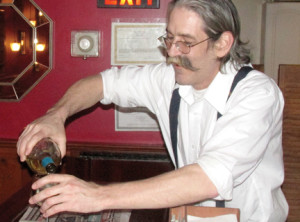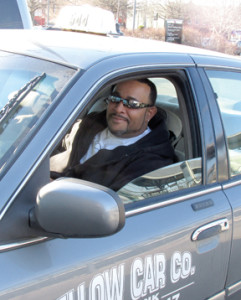Area workers tell of blessings, burdens of working nights
By John Burton
As most of us are finishing up our workday, there are those who are just starting theirs.
For a lot of them, nighttime is the right time.
Some accept working at night as a necessity of their job or a way to make additional money. Others prefer working nights or see it as a chance for career advancement, the opportunity for added excitement or as something that complements the way they’re wired.
“I don’t know where it came from but I’m just nocturnal,” said Robb McMahon of Rumson, who co-owns Murphy’s Tavern, 17 Ward Lane, Rumson, where he works nights as a bartender.
During much of his almost 30-year career as a bartender and musician, McMahon has found himself working late at night – and that’s just fine with him.
“For me, it’s the solitude” of the off-hours, he said. “The hustle and bustle of the day I don’t have to deal with.”

For others, working in the service industry of restaurants and bars can be a curse or a blessing – though most contacted for this story said they liked the hours.
Another component of working nights in bars and restaurants is the fun quotient.
“My job is a party,” said Veronica Ruggerio, a waitress at The Downtown, a popular Red Bank nightspot, 10 West Front St. Ruggerio regularly works from 4 p.m. to 3 or 4 a.m. “The money is awesome” as is the vibrancy and activity associated with the nightlife, the 19-year-old said.
Certainly one downside, Ruggerio and others said, is that they don’t get enough sleep. Ruggerio said she can survive on six hours total over a Friday, Saturday and Sunday. “Weekends are tough,” but she’ll get caught up on her rest at some point – as well as getting caught up with friends and their lives.
“Nights are better money, but it’s a different clientele,” said Jesenia Rivera, who works as a bartender at The Downtown.

Working the day shift can mean seeing a lot of regulars who work in the area and stop by for a lunch or a quick drink after work. At night, Rivera said, the bar and the area are a destination and they get a lot of people – usually a younger set – who are making the rounds and can be boisterous, loud and at times, she conceded, obnoxious.
“Some people can be really, really angry when they’re drinking,” Ruggerio said. The trick is to try to gracefully win them over. “I don’t think I ever had a customer leave angry.”
“You definitely meet different people” working nights, said John Gavakis, a waiter at Americana Diner, 1160 Highway 35, Shrewsbury.
The difference, he said, is that at night he sees people who mostly are at the end of their day. “The attitudes are different” from those who stop by during daytime hours – and that can be true of employees as well.
Over the years he’s worked his share of nights – once Gavakis worked six nights a week – and has felt its effects on his life and relationships. Now at 50, he’s over it. “I did my time. At least working daytimes you can have a life.”
Driving a taxi at nights allows one to see the entire cross section of life – for good and bad.
Rick James, who drives for Yellow Car in Red Bank, says the night is “exciting.”
Driving a taxi during the day in winter is more financially rewarding but less interesting than working nights. “It’s usually working folks, going back and forth to their job, shopping, to the doctor’s,” said James, a Shrewsbury resident. “At night people are out to party, for fun, especially in the summer.
“It’s more entertaining working at nights. Acceptable levels of behavior change,” he recalled, noting that passengers behave “like I don’t exist.”
Drug use, drinking, sexual encounters of all varieties, they are all part of what has gone on in his cab during his mostly 12-hour shifts, James said.

Red Bank patrolman Jorge Torres, who prefer working nights, said, “The nights keep you busy. There’s always something to do.”
Red Bank police work 12-hour shifts and spend a month at a time on night duty, alternating the months. When he starts his month on nights, the “first day, it’s hard to say awake, I’ll tell you,” Torres said.
The winters can be quiet, but Red Bank, with its bustling nightlife of bars, restaurants, theaters and special events during warmer weather, keeps the department busy, especially as the sun goes down, Torres said.
“Criminal activity happens all day,” he said, but the night is when police can see more of certain activities, such as disorderly person offenses.
“You never know what you’re going to get” when the night comes, he said, “and that’s why I love the job.”
The one downside, he said, is that working nights can throw the sleep rhythms off. “I probably get five hours (of sleep) on a good day” when working nights, he said. “But on average it’s more like four-and-a-half.”
Because he formerly worked as a chef, Torres experienced working nights and alternating schedules before joining the department six years ago. Thankfully, his wife offers her support, he said.
“As a police officer, the night shift opens up a lot of opportunities, professionally, as criminals like to come out under the cover of night,” said Gary Watson, a former Red Bank police officer and Monmouth County prosecutor’s office investigator, who now oversees Red Bank’s Department of Public Works. As a law enforcement officer, “you’re looking at things differently than you would during the daytime” that sharpen skills and broaden experience.
“I enjoyed night shifts. It was the best shifts,” Watson said.
Sgt. David Wentworth of the Monmouth County Sheriff’s Office agreed.
“I enjoy working nights, I really do. There’s a lot more to do,” he said. “I think working at night is where you learn this profession. There’s a lot more to deal with and there’s a lot more crime at night.”
Wentworth works with the department’s Warrant/Fugitive bureau and for much of his 18 years with the department, he has worked nights. His territory is the southern end of the county during his 4 p.m. to 2 a.m. shift.
“There’s a lot more to consider at night,” he said. “You don’t always have a good look at your surroundings. You have to be a lot more attentive to what’s going on.”
The nights are tough to get accustomed to and can sometimes make it difficult to juggle family responsibilities, many of which his wife has taken on, he said. “Luckily, she understands,” coming from a law enforcement family.
Dawn Dupre, a 911 operator with the county Sheriff’s Office Communications Center, usually works a steady 3 to 11 p.m. shift, that can require her to continue working into the early mornings if a situation requires. But, Dupre’s regular hours work well for her for a number of reasons.
“Well, for one thing I don’t have to get up early,” she said. With much of her day available, the usual stuff, like running errands, is easier to get accomplished. “Usually, during the workday, there’s nobody in the stores, there’s nobody at the mall, there’s nobody out,” she said.
“You don’t go into this line of work expecting to be off on weekends and nights and holidays,” Dupre said. “You expect to be working when you’re most needed.”
Josh Schmidt, who has been with Red Bank’s public works for 17 years, has been working the late shift since 2006. His decision was not based upon what works for his internal clock or some of the other factor. “Right now it’s kind of required, given the cost of child care,” Schmidt said. His wife works days and is at home when he’s working nights.
He’s approaching 40 and has found the nights and erratic sleep has had a way of catching up. “I’m not saying I’m old, but I’m feeling it.”
At some point in the future, when his kids are old enough, Schmidt will ask to return to days.














